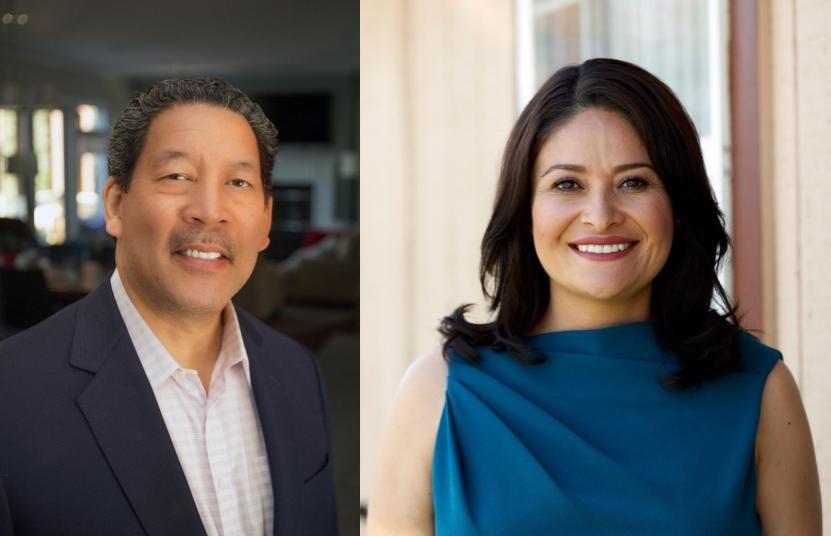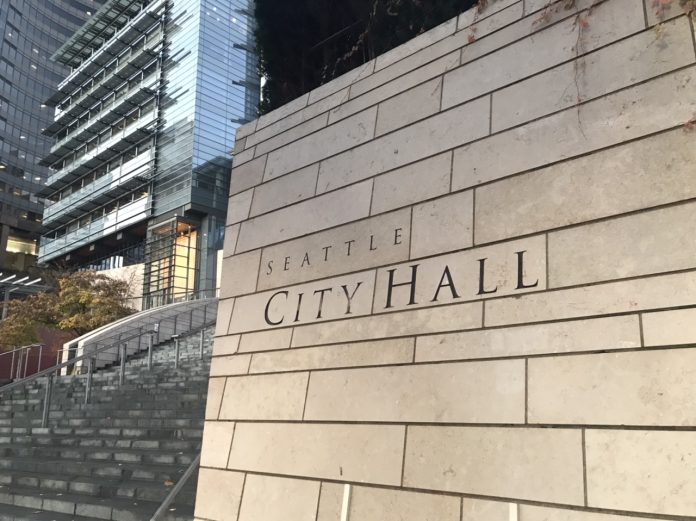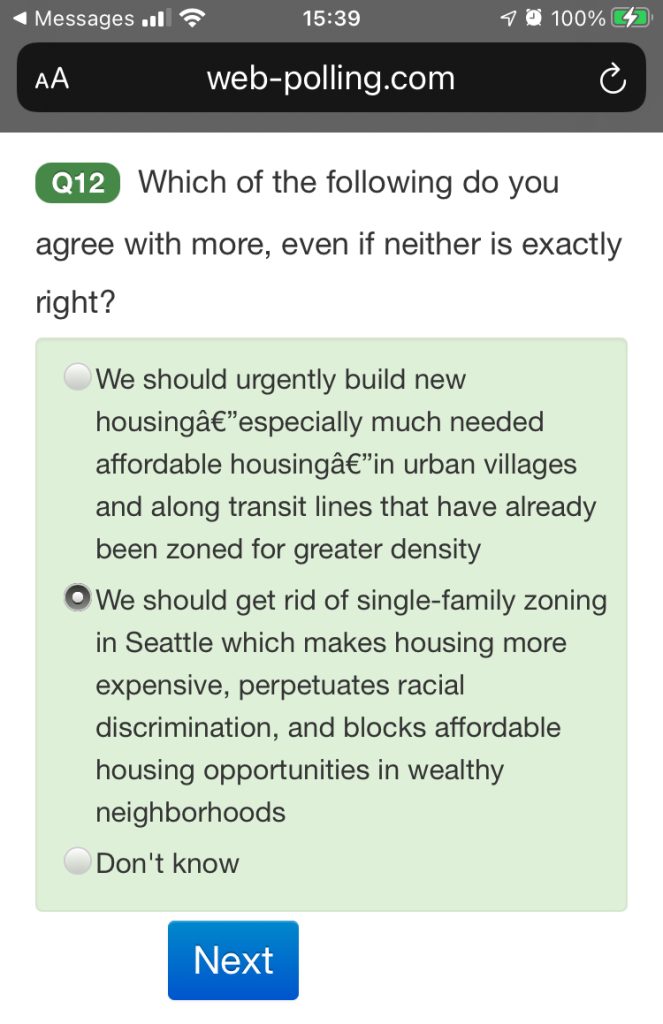The Seattle Mayoral race is shaping up to be a tight one. Just two points separated Bruce Harrell and Lorena González in the primary, and a few polls dropped in the past week, most of which indicated a close race. The outlier was a Crosscut/Elway poll that showed Bruce Harrell up 15 points, though a quarter of likely voters were undecided. González’s campaign manager Alex Koren disputed the poll, noting González was polling well below her primary total, which made little sense.
The González campaign released a polling memo that said their internal polling found the race knotted up 45 to 45, with voters very turned off by some aspects of Harrell’s record. “Importantly, a simulated campaign that includes contrasts against both González and Harrell shifts the race decidedly in González’s favor,” the memo states. “Contrasts that highlight Harrell’s corporate and Trump donor-funded independent expenditure and his record discrediting and dismissing sexual harassment and assault victims elicit are particularly resonant.”
The top donor to a “Bruce Harrell for Seattle’s Future” political action committee (PACs) is indeed Goodman Real Estate CEO George Petrie, who was also Donald Trump’s top donor in Washington State. Petrie has donated $61,250 to the PAC so far, while his business partner John Goodman has given $55,000 and his wife Alyssa Petrie is in third with $38,750. Real estate companies and moguls are all over the PAC’s top donor list including Vulcan Inc., the Runstads (of Wright Runstad & Company), Al Clise (scion of Clise Properties and Republican donor), Michael and Barbara Malone of “boutique” real estate company Hunters Capital, Zillow CEO Lloyd Frink, Jordan Selig (daughter of megadeveloper Martin Selig), and Suzie Burke, heir to a lumber baron fortune, landlord to much of Fremont, and prolific Republican donor.
Harrell also tested criticisms likely to be used against them in campaign messaging, including the Trump donor point that González’s team found so effective. A push poll that went out earlier this month predicted opponents would raise his corporate ties as well: “Harrell is supported by downtown business interests and big corporations like Amazon that have blocked tax reform, driven up housing prices, and rigged the system in their favor. As mayor he’ll do what’s best for them, not for regular Seattleites and working families who are struggling to get by and have their voices heard.”

They also seemed to be aware that supporting increasing the size of the police force and having police guild backing could be a dealbreaker for some voters. The survey tested the effect of the following paragraph: “Harrell’s solution to homelessness is sweeps and more cops, and he’s backed by corrupt police unions who oppose commonsense reform. He’s simply too conservative and will take Seattle in a dangerous direction with more discrimination and injustice.”
On the whole, Harrell appears to wagering that his tough-on-crime and tough-on-homeless-encampments positions shake out as a positive for him, but if his campaign shifts tact in coming weeks it will likely be because their poll proved a warning sign for them. The courts striking down Compassion Seattle’s pro-sweeps charter amendment might take some of the firepower out of this tactic.
The Harrell poll didn’t ask about his defense of Mayor Ed Murray during his numerous sexual harassment allegations despite being in a position to hold him accountable as City Council President. Perhaps they worried the line was too damaging to test, but the González camp seems likely to use it given their polling, and their memo also noted an incident when Harrell allegedly promoted a campaign to discredit sexual harassment accusers at a nonprofit he was serving as legal counsel.
“The poll question also mentions that Harrell allegedly told a nonprofit board to ‘launch a campaign to discredit accusers’ after a supervisor was accused of sexual harassment. Lola E. Peters, who said she served on the board of that nonprofit, relayed that story in a column for the South Seattle Emerald last month,” The Stranger‘s Rich Smith reported.
The Harrell camp also seemed worried about their stance on zoning and housing growth as they tested the popularity of something approximating their housing stance versus González’s bolder more broadly encompassing vision. The Urbanist Elections Committee (of which I’m a member) endorsed González and stressed housing and zoning reform were issues where her platform was far superior, whereas Harrell’s campaign website avoids mention of zoning.
The two options were laid out as such below, with poll respondents asked which they agree with more:
- “We should urgently building new housing especially much needed affordable housing in urban villages and along transit lines that have already been zoned for greater density.”
- “We should get rid of single-family zoning in Seattle which makes housing more expensive, perpetuates racial discrimination, and blocks affordable housing opportunities in wealthy neighborhoods.”
Housing appears to be a wedge issue in this race in more ways than one. Homeowners, who inherently skew wealthy in a city where housing is so expensive and property is accruing value so quickly, tend to favor Harrell and other moderate candidates, whereas renters are sharply breaking for González and other progressives, as a look at the precinct results map from the Primary shows. This coalescing effect could slingshot either side depending on whether younger renters can turn out at levels approaching older homeowners, who tend to be reliable voters even in the odd-year elections Seattle chooses to use to elect mayors and councilmembers.
Even with its suspect demographic splits and moderate-tilted results evoking Elway’s history of clunkers like the October 2018 poll that found Republican Dino Rossi up 10 points right before he lost to Democrat Kim Schrier by five points, the Elway poll did offer some insights on where supporters of candidates eliminated in the primary are moving.
“Voters so far appear to be coalescing around moderate or progressive blocs, with few saying they would vote for Harrell and Oliver on the same ticket, for example,” Crosscut‘s David Kroman wrote. “Of the votes up for grabs after the primary, those who said they voted for Jessyn Farrell and Casey Sixkiller in the mayoral primary appear to be splitting evenly between Harrell and González. Most of Colleen Echohawk’s voters are turning toward González while all of Art Langlie’s voters are going toward Harrell.”
If we were to correct the Elway poll by the 15-point error they had in the 2018 Schrier race, we find a tied race in the mayoral race matching the González internal polling. Either way, reading too much into polls, especially early ones, can also be a fool’s errand. Much of the campaign is still to be conducted and many voter decisions are still to be made. Who should lead Seattle through the big challenges before it? The only poll that really counts will be the election that closes November 2nd.
Correction: An earlier version incorrectly identified Jordan Selig as Martin Selig’s son rather than his daughter. She is heir apparent to her father’s real estate business.
Doug Trumm is publisher of The Urbanist. An Urbanist writer since 2015, he dreams of pedestrian streets, bus lanes, and a mass-timber building spree to end our housing crisis. He graduated from the Evans School of Public Policy and Governance at the University of Washington in 2019. He lives in Seattle's Fremont neighborhood and loves to explore the city by foot and by bike.



